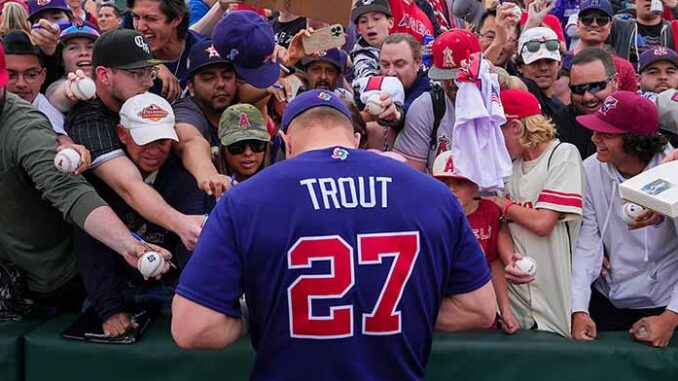
GLENDALE – The days are clear, the skies are bright and spring training sends fans out in full force to catch a glimpse of MLB’s stars at the Valley’s Cactus League ballparks.
Every day, droves of people flock to the backfields of Sloan Park, home of the Chicago Cubs, and Camelback Ranch, where the Los Angeles Dodgers and Chicago White Sox train, to watch current and future All-Stars up close.
Many of the admirers thrust trading cards, balls and gloves towards the players, hoping to get an autograph. The players can’t sign them all.
So how can fans improve their chances in the autograph mosh pit?
“You’ve just got to be very polite,” said Randy Arellano, a lifelong Dodgers fan and experienced autograph seeker. “Say, ‘Mr. Whatever, can you please sign?’ And sometimes they do, sometimes they don’t. But say thank you, be cordial, and be polite.”
Experienced players have a knack for spotting fans who really value their signature and ignoring those who only see value in trading it.
“I think you just want the fan to truly ask you for an autograph that they’re going to keep and cherish,” said Cubs first baseman Eric Hosmer.
Fans devote their free time to showing up, and players understand this. But with scheduled training, contract negotiations, pressure to perform well and circumstances beyond the baseball field, they don’t always have time to stop.
“The thing is, you have to understand the fan’s perspective of when they see players and see guys who they admire,” said Dodgers shortstop Miguel Rojas. “They’re going to be loud and cheering for you and will be trying to get your attention.
“We’re working and have places to be. So it’s not that we’re mean, and we don’t want to stop and sign autographs. It’s just that we probably don’t have time or are thinking about something else because we’re worrying about performing and doing all that.”
Rojas said he tries to accommodate as many fans as he can, whenever he can.
“I try to stop there when I can and spend five minutes of my time and pick items from people,” he said. “I’m not really picky, choosing who I’m going to sign for because I have no time for that. But I try to take care of the people who are there, and if they ask for a picture I’ll be in the picture. If they hand me a (trading) card, I’ll sign the card. Whatever items they have.”
Arellano believes the best way for fans to ensure that they go home with an autograph is to avoid being too selective about who signs. In his mind, if you’re not selling it, why does it matter which player it is?
“It doesn’t matter who I get (to sign),” Arellano said. “Yeah, sure, who would I like to have? Sandy Koufax. Growing up I saw him pitch as a little kid. So, it’s just fun for me. It’s a hobby.”
Approaching his 16th season in the majors, Dodgers pitcher Clayton Kershaw isn’t the historically dominant force he once was but is still among the top arms in the majors.
Being a three-time Cy Young Award winner, an MVP, a World Series champion and surefire Hall of Famer means people will want his attention no matter how he’s performing.
Kershaw makes signing for kids a priority, because he used to seek autographs and now he has kids of his own.
He said he tries to fulfill everyone’s requests when he has the time, but will always sign for children first.
“I get it, I was a kid once, and now I’m a parent, too,” Kershaw said. “You always want your kid to be able to get what they want at times. The fans do a great job. Just don’t scream, ‘You suck!’ then ask for an autograph.
“But, other than that, you’re good.”
Players usually can sniff out genuine fans versus those looking to make a quick buck off their signature on memorabilia. And they recognize faces that show up over and over across the cities they travel to during the season.. They learn who will cherish the item and who only wants to sell it.
“I think the only people in the world who might not like me too much are the guys that are clearly looking for signatures that they’re going to sell off,” said Trey Mancini of the Cubs.
Many fans aren’t fond of resellers, either.
“I know some folks here are getting things signed for resale, and I think that’s wrong,” said one fan who preferred to remain anonymous. “Don’t be too rude, and just be appreciative of the guys spending time to sign balls for fans.”
RELATED STORY: Rattlesnake sausages? Cactus League ballparks up their game for spring training
Hosmer agreed.
“You certainly don’t want to turn down a kid or someone who wants an autograph for the right reasons,” he said. “But the reality of it is, there are people out there who sell it and do stuff with it. But that doesn’t take away from all the other people that are out there just trying to get something from one of their favorite players.”
Autographs can evoke memories of epic wins and heartbreaking losses. They give a glimpse into who the biggest stars of the moment were and whether they panned out or didn’t.
Most importantly, they provide fans a way to hold onto a memory of the time they saw their favorite player or team.
“I realize some people do it for a living or to make money, but I do it just to do it,” Arellano said. “You put (the autograph) in an album and you open it up at night. You look at it, and it’s just like going through a photo album. It’s the same thing.
“It’s just fun.”
